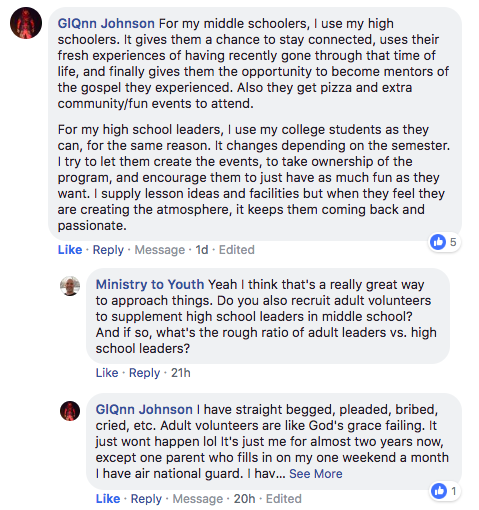FRUSTRATED?

Written by Nick Diliberto
I have a question to ask…
What’s the biggest source of frustration in your youth ministry right now?
I posted that question on our Facebook page last week and received over 100 comments.
The top two frustrations were:
#1 – LACK OF PARENTAL SUPPORT
This would include parents who do not prioritize youth group over sports & other activities, not nurturing students’ faith at home, etc.
When parents make sports and other activities a higher importance, it affects attendance, which can really be frustrating to youth leaders. Especially when students want to show up, but their parents seem to get in the way. We know the environment we create has the power to nurture a student’s relationship with God and others, and we expect parents to support the vision. So, it can be upsetting when their actions show otherwise.
Another issue closely related to this one is how that pattern of behavior often continues when students are old enough to drive. Although they want to come to youth group, they seem to put sports and other activities as a higher priority.
Then, there is the fact that many parents do not nurture their students’ faith at home. They seem to expect the youth ministry to primarily take on this responsibility – which, of course, can cause more frustration if they’re not even making it a priority to get students to youth services. Furthermore, we know deep down that parents can make a huge impact on students’ lives. The more they can help deepen students’ faith, the better.
#2 – LACK OF VOLUNTEERS
Sometimes this is due to lack of parental support. Often, it’s simply a lack of church support or the fact that no one is stepping up to the plate to serve. And often, only a fraction of those that do volunteer are actually dedicated and committed.
It can feel lonely being the only one (or one of a few) that takes the vision of the youth ministry seriously. Plus, we simply need more people to help. Students need loving and caring adults to invest in their lives, walk alongside them through the teenage years, and encourage their relationship with God.
OTHER FRUSTRATIONS
There were plenty of other frustrations mentioned other than these two. A couple of comments that came up over and over again were: lack of financial or church support, and lack of obedience or respect from students during the lesson time.
I’m sure the list goes on. And on. And on.
SO, HOW DO YOU ADDRESS YOUR BIGGEST FRUSTRATION?
In this blog post, I want to help you answer that question, regardless of what your frustration point is at this moment.
I’ve come up with a few steps to take that will empower you to address whatever is frustrating you. These steps will help you get to the root problem and come up with some creative solutions to resolve the problem.
I also share my own thoughts and ideas from the Ministry to Youth community on how to specifically address the two biggest frustration points mentioned above.
Let’s start with some basic steps to take to resolve your biggest frustration.
#1 – CLARIFY THE ROOT PROBLEM.
Often, the real problem isn’t what you think. You need to go a bit deeper. How do you do that?
Ask yourself what is frustrating you the most right now in your youth ministry.
Take time to think, pray, and maybe even journal about it. Sit with it for a while. Ask God to give you some clarity on what’s really going on.
Let’s say the point of frustration is that parents aren’t nurturing their students’ faith at home. What’s really going on here? Is it that parents are not interested in doing this? Or do they want to, but don’t know how? Or are they overly busy and overwhelmed? Or are they scared and intimidated at doing this? Or is it something else?
After giving it some thought, you might come to the conclusion that the problem is two-fold. Parents in your church want to nurture their kids’ faith, but are overly busy and overwhelmed. And they don’t know how.
Now, you can come up with some solutions to address those specific issues.
This is just an example.
But do you see how identifying the root problem can be really helpful?
We often see a problem at face value. In order to address the situation, we need to first identify what’s really going on. It’s the starting point.
#2 – WHAT COULD GOD BE DOING IN THIS FRUSTRATING SITUATION?
Remember that God is always moving and working in our lives. Especially in frustrating circumstances.
Be on the lookout for what that might be.
As youth leaders, we already know this. We’ve probably taught multiple messages on that idea in the past.
But it’s so easy to forget in the craziness of ministry.
When things get frustrating, take time to process what God is doing in your heart, life, and ministry.
#3 – IS THERE SOMETHING YOU CAN DO TO IMPROVE THE SITUATION?
Don’t ignore the problem, endlessly complain about it, blame others, or give up hope.
Instead of focusing on the problem, focus on the solution.
Ask yourself this simple question:
Is there something I can do to improve the situation?
Sincerely go to God with the problem. Ask for his guidance.
If an idea presents itself, take action.
Give it a try. Go for it.
When you take action towards a possible solution, it feels amazing. You’re no longer stuck, but moving forward.
Action requires courage. You might even feel uncomfortable and unsure about the new approach. But that’s a part of the process.
It takes guts to create change and try something new.
Sometimes you’ll find a solution on your first attempt. Other times you’ll fail. But you keep going. Coming up with new ways to address the problem until you finally find an approach that works.
However, sometimes there is nothing you can do to improve the situation. It’s totally out of your control. In that case, you simply need to let go and surrender the situation to God. Detach and give up control.
(In fact, it’s important to let go and surrender the situation to God regardless of whether or not you can do something to change the situation.)
The only thing you can control is your attitude towards the situation. You can turn bitter, angry, and resentful.
Or you can look at the situation as an opportunity for growth. It could be an opportunity to become more patient, kind, compassionate, accepting, understanding or tolerant.
Sometimes you deeply believe there is something you can do about the problem. You’ve tried multiple approaches, none of which have worked out.
In other words, you hit a wall.
Let’s talk what to do in that situation.
#4 – WHAT TO DO WHEN YOU HIT A WALL
It can really be helpful to connect with other youth ministry leaders. We’re all in this together. When you get stuck, ask other leaders for ideas. We can all learn from each other.
The easiest way to do this is to join a Facebook group. Two of the best groups I know of are: Stuff You Can Use and Youthmin.
If you haven’t joined either group, I encourage you to do so.
Furthermore, your church’s denomination or affiliation might have some type of youth ministry network. Seek it out. Get involved. Ask questions. Contribute to the conversation.
Another idea is to start a local networking group of youth pastors.
Meet once a month or quarterly to collectively brainstorm solutions to your youth ministry problems.
You can also meet with your volunteer team.
We often forget to ask for their input. We’re not alone in this. Ask for their thoughts on how to address the problem.
Lastly, attend youth ministry conferences.
There was a time I went to all the workshops and main sessions at a conference.
I no longer do this. Instead, I intentionally seek out people I want to spend time with and focus on meeting new people at conferences.
The idea is to meet up in person with other leaders so we can grow and learn from each other.
Although I still go to some of the main sessions and workshops, I find these interactions are much more helpful.
Now…
Let’s go back to the top 2 frustrations I mentioned earlier in the blog post.
HERE ARE SOME THOUGHTS FROM THE MINISTRY TO YOUTH COMMUNITY ABOUT THE TOP 2 FRUSTRATIONS.
After getting over 100 comments from youth leaders, I posted a question asking for ideas on how to specifically solve the top 2 problems.
The first question I asked was:
What solution do you have for lack of parental support?
This would include parents not making youth group a priority over sports & other activities, parents not nurturing students’ faith at home, etc.
Here are some of the responses I thought were really helpful (go here to see all the comments):




I hope you find some of the comments helpful!
I do think there is a lot to say about providing opportunities for parents and students to attend an event together.
Not for an informational meeting, but one filled with encouragement, prayer and community. It’s a simple way for your ministry to communicate that you exist to support and encourage families.
And the more you can do to resource and equip parents, the better.
Help them disciple their kids and teenagers at home. Give them resources to become better parents, etc.
The youth ministries who do this type of stuff seem to have greater buy-in from parents.
Ok, now let’s address problem #2. I have to admit there were a lot fewer comments that provided solutions on this one.
The specific question I posted was:
What’s your most effective method for recruiting committed
& dedicated youth ministry volunteers?
This is the comment I thought was the most helpful:

If you can model what GIQnn mentioned here, that’s great. And it would be ideal if you can mix in some adults in there to balance it all out, especially in junior high. But I do recognize that in some cases that might not be a reality.
The only other thing I would add to that is to tap into parents. And this goes back to issue #1. If you can resource and equip parents, and regularly host events for parents & students to attend together…
…then you might just have some parents see the value you provide more clearly. And some of them might even step up to the plate and volunteer.
I have some more thoughts, but you’ve probably heard them all. Here it goes:
- Avoid asking for a big commitment up front. Instead, give them baby steps. Ask a potential volunteer to show up to an event or midweek/weekend service to first observe what happens. Then, ask them to do something small. Serve snacks/drinks at an upcoming event. Assist a small group leader for one week. Greet students for one or two weeks. The idea is to start small. Then, go from there. Once they get a feel for what you do, and you get a gauge on them, you can move on to something bigger.
- When doing an “ask” in front of the church or one-on-one, help remove the barriers that people often have about working with teenagers. Many find teens intimidating. People also carry around baggage with them from being a teenager. Get to the heart of the matter. Talk about the power of simply showing up in the lives of young people. Students just need loving, caring adults who are interested in them and want to walk alongside them.
- Tap into the young adult community at your church. If there is none, then get to know some of the young adults in your church and ask them if they would be willing to consider helping.
- Have a conversation with the older people at your church. For years, especially as a young leader, I resisted this one. They often get overlooked. But empty-nesters (and even those who are older) have more time and a lot of wisdom to share with youth. Reach out to them.
If you have any ideas that have worked in your ministry, please comment below.
Ok, well there you have it.
I hope you’ve found this blog post helpful.
My prayer is that you’ll be inspired to take action on something you read here.
– Nick Diliberto, Ministry to Youth
DOWNLOAD THE PDF OF THIS BLOG POST
Liked this blog post? Then you’ll also like this one written by Nick:
How to 10x Your Productivity in Ministry

Nick Diliberto is the creator of Ministry to Youth, a collection of youth ministry websites (including this one). He’s married to gnarly triathlete and dad to three teenagers. He’s been involved in church leadership for over 18 years.
